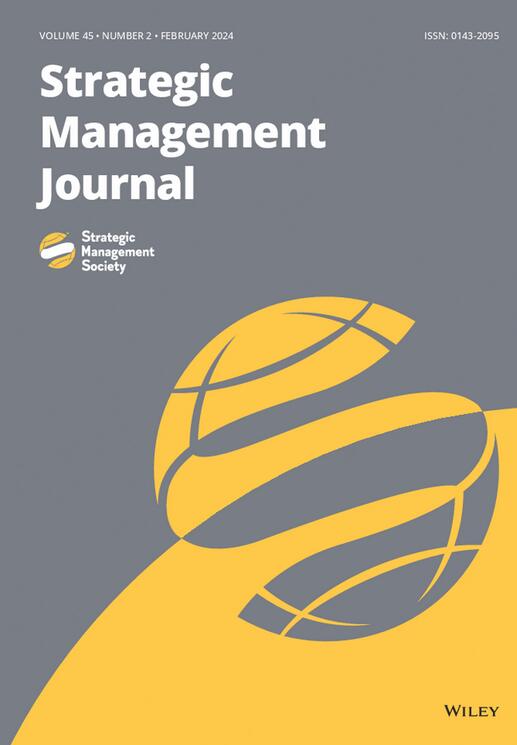Do financial market frictions hurt the performance of women‐led ventures? A meta‐analytic investigation
IF 7.2
1区 管理学
Q1 BUSINESS
引用次数: 1
Abstract
Abstract Research Summary Extant research offers conflicting views about the size and nature of gender‐related disparities in venture financing and venture performance. We theorize that gender‐related frictions in debt financing, the most common source of capital for new ventures, materially impair the performance of women‐led ventures but that these frictions decline with financial development. We find strong support for these predictions in a meta‐analysis of 63 primary studies in which we use financial development to instrument for the impact of gender‐related financial frictions on venture performance; in fact, in the absence of gender‐related financial frictions, ventures led by women would modestly outperform ventures led by men. We also find that gender‐related financial frictions are greater for access to, than the terms of, debt financing. Managerial Summary We use meta‐analysis to offer a quantitative synthesis of the research on gender, venture finance, and venture performance. We find evidence that women encounter gender‐related frictions in obtaining debt financing for their ventures, materially impairing their ventures' performance. In fact, in the absence of these frictions, ventures led by women would modestly outperform ventures led by men. We also find that gender‐related frictions in venture finance are greater for access to, than the terms of, debt financing and that these frictions tend to be stronger in countries with less developed financial institutions and markets.金融市场摩擦是否会损害女性领导企业的业绩?一项荟萃分析调查
现有的研究对风险融资和风险绩效中性别相关差异的大小和性质提出了相互矛盾的观点。我们的理论是,在债务融资(新企业最常见的资金来源)中,与性别相关的摩擦严重损害了女性领导的企业的业绩,但这些摩擦随着金融发展而下降。我们在对63项主要研究的荟萃分析中发现了对这些预测的有力支持,在这些研究中,我们使用金融发展来衡量与性别相关的金融摩擦对风险绩效的影响;事实上,在不存在与性别相关的财务摩擦的情况下,女性领导的企业会略微优于男性领导的企业。我们还发现,与性别相关的金融摩擦在获得债务融资方面比在债务融资条款方面更大。我们使用元分析对性别、风险融资和风险绩效的研究进行定量综合。我们发现有证据表明,女性在为其企业获得债务融资时遇到了与性别相关的摩擦,从而严重影响了其企业的业绩。事实上,在没有这些摩擦的情况下,女性领导的企业的表现会略微好于男性领导的企业。我们还发现,风险融资中与性别相关的摩擦在获得债务融资方面比在条款方面更大,而且在金融机构和市场欠发达的国家,这些摩擦往往更强。
本文章由计算机程序翻译,如有差异,请以英文原文为准。
求助全文
约1分钟内获得全文
求助全文
来源期刊

Strategic Management Journal
Multiple-
CiteScore
13.70
自引率
8.40%
发文量
109
期刊介绍:
At the Strategic Management Journal, we are committed to publishing top-tier research that addresses key questions in the field of strategic management and captivates scholars in this area. Our publication welcomes manuscripts covering a wide range of topics, perspectives, and research methodologies. As a result, our editorial decisions truly embrace the diversity inherent in the field.
 求助内容:
求助内容: 应助结果提醒方式:
应助结果提醒方式:


